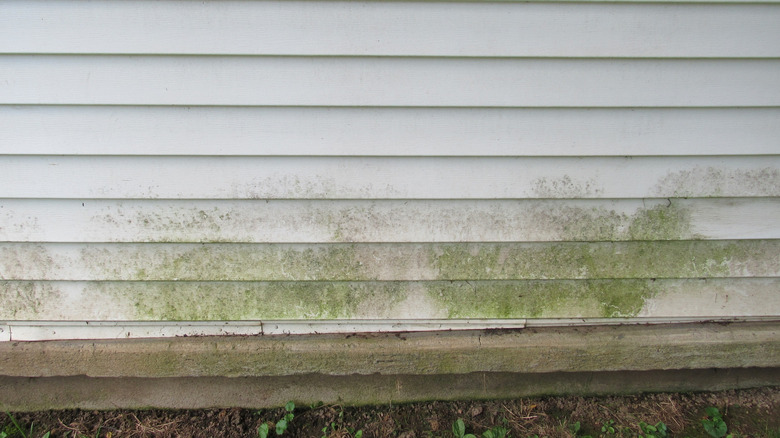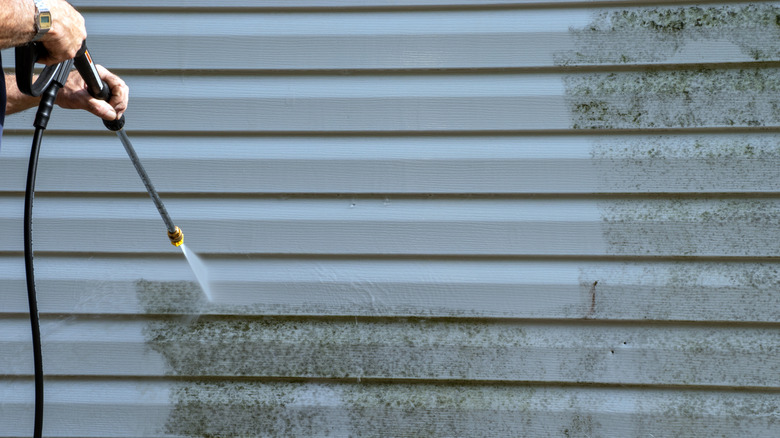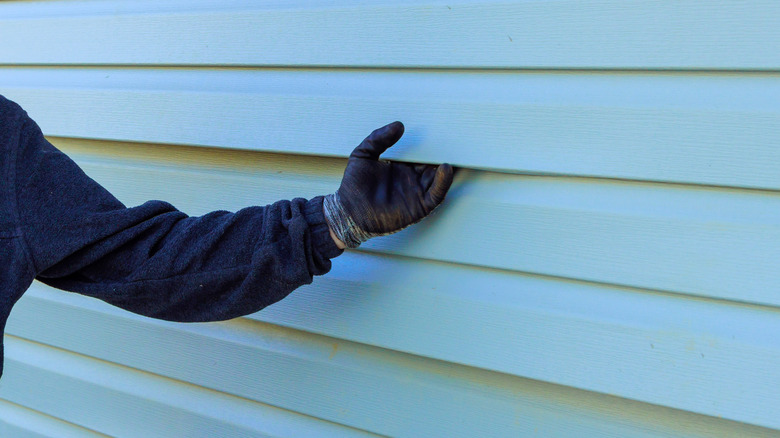What To Know Before Using A Pressure Washer On Your Vinyl Siding
We may receive a commission on purchases made from links.
Pressure washing your vinyl siding may seem like the quickest way to get it clean, but you can't rush into the process. Not every manufacturer recommends using a pressure washer to wash vinyl siding and some may even warn against it entirely. In some cases, using a power washer can even void your warranty. While vinyl is known as a low-maintenance siding material, you still need to use proper pressure washing techniques or you could damage the surface.
Vinyl siding can collect debris like grass clippings, pollen, dust, and dirt on its surface. Cleaning your siding isn't just an aesthetic choice, it's also a practical one. Dirty siding offers the perfect place for mold growth, especially for areas without direct sunlight . These shaded areas can develop mold as a result of moisture, from rain or humidity, coming into contact with the surface grime. While there are many tools for cleaning vinyl siding so it looks new, a power washer can be a convenient, quick, and relatively easy option — especially compared to manually cleaning with a scrub brush and soap. If you're new to cleaning with a power washer, there's a lot you need to know to pressure wash your home.
How to properly clean vinyl siding with a pressure washer
Water alone can clean your siding, but for the best results, use a premixed solution to make your vinyl siding look new again. Try a formulated cleaner, such as Simple Green Oxy Solve Total Outdoor Pressure Washer Cleaner, or use 70% water with 30% distilled white vinegar in a bucket. Once ready, fill your pressure washer and cover nearby plants and flowers with a plastic tarp to shield them from any runoff. With your washer at a PSI of 1,300-1,500, spray the solution at a 45-degree angle. This angled approach lets you quickly wash away grime without driving water underneath the panels. You can start spraying from a minimum of 12 inches, but some vinyl experts suggest first spraying from 3 feet away to avoid causing damage. If you see any siding move from the pressure, pull back immediately.
After you've thoroughly coated the surface with your cleaner, let it sit for at least 15 to 30 minutes. The mixture will get to work by breaking down the gunk and grime, making it easier to wash away. For particularly tough jobs, or if you haven't cleaned your vinyl siding in a long time, scrub gently with a soft brush. After your cleaner sits long enough, rinse with clean water, keeping your nozzle at the same angle and PSI as before. Wash away all of the cleaner carefully, spraying from top to bottom, and keep spraying until all of the soap or cleaner residue is gone.
More tips for pressure washing vinyl siding
Whether it's your first time or your sixth time pressure washing your siding, always inspect the exterior of your home first. Look for any loose, rotting, or broken panels, and avoid spraying them. The pressure could further damage these areas, potentially letting water seep in and leading to a more costly repair. After that, double-check that all of your windows or doors are closed. Timing is crucial when pressure washing. Most experts recommend doing so between spring and fall as these months offer the most favorable weather conditions. While you can power wash your home anytime of day, spraying in direct sunlight — or the hottest part of the day – risks the sun drying up your water or cleaner before it can work its magic. You'll not only prolong the cleaning process, but you might end up with streaks or residue left behind.
Remember that a power washer is a powerful piece of equipment, and improper use can cause injury or serious damage. Use caution when operating, making sure to wear protective eyewear and closed-toe shoes to protect yourself from the spray. If possible, also wear gloves as these can both protect your hands and deliver a secure grip. Keep pets and children away while you clean, and never aim the stream towards people or animals as the powerful spray can cause injury, sometimes serious.


